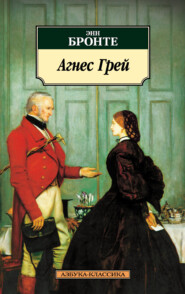По всем вопросам обращайтесь на: info@litportal.ru
(©) 2003-2025.
✖
The Tenant of Wildfell Hall
Настройки чтения
Размер шрифта
Высота строк
Поля
She was silent. Her pale lips quivered, and her fingers trembled with agitation, as she nervously entwined them in the hair-chain to which was appended her small gold watch – the only thing of value she had permitted herself to keep. I had said an unjust and cruel thing; but I must needs follow it up with something worse.
'But, Helen!' I began in a soft, low tone, not daring to raise my eyes to her face, 'that man is not your husband: in the sight of heaven he has forfeited all claim to – ' She seized my arm with a grasp of startling energy.
'Gilbert, don't!' she cried, in a tone that would have pierced a heart of adamant. 'For God's sake, don't you attempt these arguments! No fiend could torture me like this!'
'I won't, I won't!' said I, gently laying my hand on hers; almost as much alarmed at her vehemence as ashamed of my own misconduct.
'Instead of acting like a true friend,' continued she, breaking from me, and throwing herself into the old arm-chair, 'and helping me with all your might – or rather taking your own part in the struggle of right against passion – you leave all the burden to me; – and not satisfied with that, you do your utmost to fight against me – when you know that! – ' she paused, and hid her face in her handkerchief.
'Forgive me, Helen!' pleaded I. 'I will never utter another word on the subject. But may we not still meet as friends?'
'It will not do,' she replied, mournfully shaking her head; and then she raised her eyes to mine, with a mildly reproachful look that seemed to say, 'You must know that as well as I.'
'Then what must we do?' cried I, passionately. But immediately I added in a quieter tone – 'I'll do whatever you desire; only don't say that this meeting is to be our last.'
'And why not? Don't you know that every time we meet the thoughts of the final parting will become more painful? Don't you feel that every interview makes us dearer to each other than the last?'
The utterance of this last question was hurried and low, and the downcast eyes and burning blush too plainly showed that she, at least, had felt it. It was scarcely prudent to make such an admission, or to add – as she presently did – 'I have power to bid you go, now: another time it might be different,' – but I was not base enough to attempt to take advantage of her candour.
'But we may write,' I timidly suggested. 'You will not deny me that consolation?'
'We can hear of each other through my brother.'
'Your brother!' A pang of remorse and shame shot through me. She had not heard of the injury he had sustained at my hands; and I had not the courage to tell her. 'Your brother will not help us,' I said: 'he would have all communion between us to be entirely at an end.'
'And he would be right, I suppose. As a friend of both, he would wish us both well; and every friend would tell us it was our interest, as well as our duty, to forget each other, though we might not see it ourselves. But don't be afraid, Gilbert,' she added, smiling sadly at my manifest discomposure; 'there is little chance of my forgetting you. But I did not mean that Frederick should be the means of transmitting messages between us – only that each might know, through him, of the other's welfare; – and more than this ought not to be: for you are young, Gilbert, and you ought to marry – and will some time, though you may think it impossible now: and though I hardly can say I wish you to forget me, I know it is right that you should, both for your own happiness, and that of your future wife; – and therefore I must and will wish it,' she added resolutely.
'And you are young too, Helen,' I boldly replied; 'and when that profligate scoundrel has run through his career, you will give your hand to me – I'll wait till then.'
But she would not leave me this support. Independently of the moral evil of basing our hopes upon the death of another, who, if unfit for this world, was at least no less so for the next, and whose amelioration would thus become our bane and his greatest transgression our greatest benefit, – she maintained it to be madness: many men of Mr. Huntingdon's habits had lived to a ripe though miserable old age. 'And if I,' said she, 'am young in years, I am old in sorrow; but even if trouble should fail to kill me before vice destroys him, think, if he reached but fifty years or so, would you wait twenty or fifteen – in vague uncertainty and suspense – through all the prime of youth and manhood – and marry at last a woman faded and worn as I shall be – without ever having seen me from this day to that? – You would not,' she continued, interrupting my earnest protestations of unfailing constancy, – 'or if you would, you should not. Trust me, Gilbert; in this matter I know better than you. You think me cold and stony-hearted, and you may, but – '
'I don't, Helen.'
'Well, never mind: you might if you would: but I have not spent my solitude in utter idleness, and I am not speaking now from the impulse of the moment, as you do. I have thought of all these matters again and again; I have argued these questions with myself, and pondered well our past, and present, and future career; and, believe me, I have come to the right conclusion at last. Trust my words rather than your own feelings now, and in a few years you will see that I was right – though at present I hardly can see it myself,' she murmured with a sigh as she rested her head on her hand. 'And don't argue against me any more: all you can say has been already said by my own heart and refuted by my reason. It was hard enough to combat those suggestions as they were whispered within me; in your mouth they are ten times worse, and if you knew how much they pain me you would cease at once, I know. If you knew my present feelings, you would even try to relieve them at the expense of your own.'
'I will go – in a minute, if that can relieve you – and NEVER return!' said I, with bitter emphasis. 'But, if we may never meet, and never hope to meet again, is it a crime to exchange our thoughts by letter? May not kindred spirits meet, and mingle in communion, whatever be the fate and circumstances of their earthly tenements?'
'They may, they may!' cried she, with a momentary burst of glad enthusiasm. 'I thought of that too, Gilbert, but I feared to mention it, because I feared you would not understand my views upon the subject. I fear it even now – I fear any kind friend would tell us we are both deluding ourselves with the idea of keeping up a spiritual intercourse without hope or prospect of anything further – without fostering vain regrets and hurtful aspirations, and feeding thoughts that should be sternly and pitilessly left to perish of inanition.'
'Never mind our kind friends: if they can part our bodies, it is enough; in God's name, let them not sunder our souls!' cried I, in terror lest she should deem it her duty to deny us this last remaining consolation.
'But no letters can pass between us here,' said she, 'without giving fresh food for scandal; and when I departed, I had intended that my new abode should be unknown to you as to the rest of the world; not that I should doubt your word if you promised not to visit me, but I thought you would be more tranquil in your own mind if you knew you could not do it, and likely to find less difficulty in abstracting yourself from me if you could not picture my situation to your mind. But listen,' said she, smilingly putting up her finger to check my impatient reply: 'in six months you shall hear from Frederick precisely where I am; and if you still retain your wish to write to me, and think you can maintain a correspondence all thought, all spirit – such as disembodied souls or unimpassioned friends, at least, might hold, – write, and I will answer you.'
'Six months!'
'Yes, to give your present ardour time to cool, and try the truth and constancy of your soul's love for mine. And now, enough has been said between us. Why can't we part at once?' exclaimed she, almost wildly, after a moment's pause, as she suddenly rose from her chair, with her hands resolutely clasped together. I thought it was my duty to go without delay; and I approached and half extended my hand as if to take leave – she grasped it in silence. But this thought of final separation was too intolerable: it seemed to squeeze the blood out of my heart; and my feet were glued to the floor.
'And must we never meet again?' I murmured, in the anguish of my soul.
'We shall meet in heaven. Let us think of that,' said she in a tone of desperate calmness; but her eyes glittered wildly, and her face was deadly pale.
'But not as we are now,' I could not help replying. 'It gives me little consolation to think I shall next behold you as a disembodied spirit, or an altered being, with a frame perfect and glorious, but not like this! – and a heart, perhaps, entirely estranged from me.'
'No, Gilbert, there is perfect love in heaven!'
'So perfect, I suppose, that it soars above distinctions, and you will have no closer sympathy with me than with any one of the ten thousand thousand angels and the innumerable multitude of happy spirits round us.'
'Whatever I am, you will be the same, and, therefore, cannot possibly regret it; and whatever that change may be we know it must be for the better.'
'But if I am to be so changed that I shall cease to adore you with my whole heart and soul, and love you beyond every other creature, I shall not be myself; and though, if ever I win heaven at all, I must, I know, be infinitely better and happier than I am now, my earthly nature cannot rejoice in the anticipation of such beatitude, from which itself and its chief joy must be excluded.'
'Is your love all earthly, then?'
'No, but I am supposing we shall have no more intimate communion with each other than with the rest.'
'If so, it will be because we love them more, and not each other less. Increase of love brings increase of happiness, when it is mutual, and pure as that will be.'
'But can you, Helen, contemplate with delight this prospect of losing me in a sea of glory?'
'I own I cannot; but we know not that it will be so; – and I do know that to regret the exchange of earthly pleasures for the joys of heaven, is as if the grovelling caterpillar should lament that it must one day quit the nibbled leaf to soar aloft and flutter through the air, roving at will from flower to flower, sipping sweet honey from their cups, or basking in their sunny petals. If these little creatures knew how great a change awaited them, no doubt they would regret it; but would not all such sorrow be misplaced? And if that illustration will not move you, here is another:– We are children now; we feel as children, and we understand as children; and when we are told that men and women do not play with toys, and that our companions will one day weary of the trivial sports and occupations that interest them and us so deeply now, we cannot help being saddened at the thoughts of such an alteration, because we cannot conceive that as we grow up our own minds will become so enlarged and elevated that we ourselves shall then regard as trifling those objects and pursuits we now so fondly cherish, and that, though our companions will no longer join us in those childish pastimes, they will drink with us at other fountains of delight, and mingle their souls with ours in higher aims and nobler occupations beyond our present comprehension, but not less deeply relished or less truly good for that, while yet both we and they remain essentially the same individuals as before. But, Gilbert, can you really derive no consolation from the thought that we may meet together where there is no more pain and sorrow, no more striving against sin, and struggling of the spirit against the flesh; where both will behold the same glorious truths, and drink exalted and supreme felicity from the same fountain of light and goodness – that Being whom both will worship with the same intensity of holy ardour – and where pure and happy creatures both will love with the same divine affection? If you cannot, never write to me!'
'Helen, I can! if faith would never fail.'
'Now, then,' exclaimed she, 'while this hope is strong within us – '
'We will part,' I cried. 'You shall not have the pain of another effort to dismiss me. I will go at once; but – '
I did not put my request in words: she understood it instinctively, and this time she yielded too – or rather, there was nothing so deliberate as requesting or yielding in the matter: there was a sudden impulse that neither could resist. One moment I stood and looked into her face, the next I held her to my heart, and we seemed to grow together in a close embrace from which no physical or mental force could rend us. A whispered 'God bless you!' and 'Go – go!' was all she said; but while she spoke she held me so fast that, without violence, I could not have obeyed her. At length, however, by some heroic effort, we tore ourselves apart, and I rushed from the house.
I have a confused remembrance of seeing little Arthur running up the garden-walk to meet me, and of bolting over the wall to avoid him – and subsequently running down the steep fields, clearing the stone fences and hedges as they came in my way, till I got completely out of sight of the old hall and down to the bottom of the hill; and then of long hours spent in bitter tears and lamentations, and melancholy musings in the lonely valley, with the eternal music in my ears, of the west wind rushing through the overshadowing trees, and the brook babbling and gurgling along its stony bed; my eyes, for the most part, vacantly fixed on the deep, chequered shades restlessly playing over the bright sunny grass at my feet, where now and then a withered leaf or two would come dancing to share the revelry; but my heart was away up the hill in that dark room where she was weeping desolate and alone – she whom I was not to comfort, not to see again, till years or suffering had overcome us both, and torn our spirits from their perishing abodes of clay.
There was little business done that day, you may be sure. The farm was abandoned to the labourers, and the labourers were left to their own devices. But one duty must be attended to; I had not forgotten my assault upon Frederick Lawrence; and I must see him to apologise for the unhappy deed. I would fain have put it off till the morrow; but what if he should denounce me to his sister in the meantime? No, no! I must ask his pardon to-day, and entreat him to be lenient in his accusation, if the revelation must be made. I deferred it, however, till the evening, when my spirits were more composed, and when – oh, wonderful perversity of human nature! – some faint germs of indefinite hopes were beginning to rise in my mind; not that I intended to cherish them, after all that had been said on the subject, but there they must lie for a while, uncrushed though not encouraged, till I had learnt to live without them.
Arrived at Woodford, the young squire's abode, I found no little difficulty in obtaining admission to his presence. The servant that opened the door told me his master was very ill, and seemed to think it doubtful whether he would be able to see me. I was not going to be baulked, however. I waited calmly in the hall to be announced, but inwardly determined to take no denial. The message was such as I expected – a polite intimation that Mr. Lawrence could see no one; he was feverish, and must not be disturbed.
'I shall not disturb him long,' said I; 'but I must see him for a moment: it is on business of importance that I wish to speak to him.'
'I'll tell him, sir,' said the man. And I advanced further into the hall and followed him nearly to the door of the apartment where his master was – for it seemed he was not in bed. The answer returned was that Mr. Lawrence hoped I would be so good as to leave a message or a note with the servant, as he could attend to no business at present.
'He may as well see me as you,' said I; and, stepping past the astonished footman, I boldly rapped at the door, entered, and closed it behind me. The room was spacious and handsomely furnished – very comfortably, too, for a bachelor. A clear, red fire was burning in the polished grate: a superannuated greyhound, given up to idleness and good living, lay basking before it on the thick, soft rug, on one corner of which, beside the sofa, sat a smart young springer, looking wistfully up in its master's face – perhaps asking permission to share his couch, or, it might be, only soliciting a caress from his hand or a kind word from his lips. The invalid himself looked very interesting as he lay reclining there, in his elegant dressing-gown, with a silk handkerchief bound across his temples. His usually pale face was flushed and feverish; his eyes were half closed, until he became sensible of my presence – and then he opened them wide enough: one hand was thrown listlessly over the back of the sofa, and held a small volume, with which, apparently, he had been vainly attempting to beguile the weary hours. He dropped it, however, in his start of indignant surprise as I advanced into the room and stood before him on the rug. He raised himself on his pillows, and gazed upon me with equal degrees of nervous horror, anger, and amazement depicted on his countenance.
'Mr. Markham, I scarcely expected this!' he said; and the blood left his cheek as he spoke.
'I know you didn't,' answered I; 'but be quiet a minute, and I'll tell you what I came for.' Unthinkingly, I advanced a step or two nearer. He winced at my approach, with an expression of aversion and instinctive physical fear anything but conciliatory to my feelings. I stepped back, however.
'Make your story a short one,' said he, putting his hand on the small silver bell that stood on the table beside him, 'or I shall be obliged to call for assistance. I am in no state to bear your brutalities now, or your presence either.' And in truth the moisture started from his pores and stood on his pale forehead like dew.
Such a reception was hardly calculated to diminish the difficulties of my unenviable task. It must be performed however, in some fashion; and so I plunged into it at once, and floundered through it as I could.
















